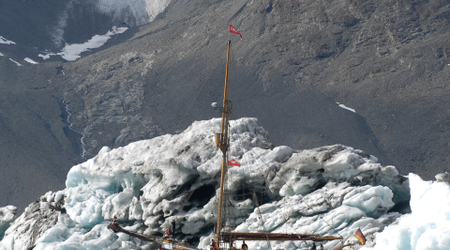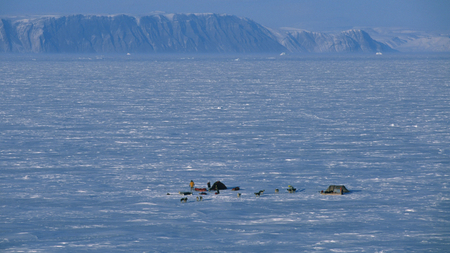Polar Explorer Arved Fuchs and the world of expeditions
The U2 in the realm of eternal ice
Arved Fuchs is the most famous adventurer in Germany. At least, this is how the native of Schleswig-Holstein (state of Germany) is frequently described in the media. This is all the more surprising because two elements of the statement are not quite correct.
For more than thirty years he has led expeditions to the most remote corners of the globe – frequently under extreme conditions. For example, in 1977 there was the two-month trip up the De Pas and George Rivers in the Canadian province of Quebec in traditional Indian canoes.

That was followed by numerous other journeys. In 1981 he crossed the Atlantic in a sailboat; in 1983 he explored Greenland by dogsled; and he rounded Cape Horn in a collapsible boat in the winter of 1984. In 1993 he sailed through the Northwest Passage within one year without an icebreaker. His boat, the “Dagmar Aaen”, a shark cutter restored in 1988, was the first sailboat to circumnavigate all of North and South America without an icebreaker. In 2000 he retraced the legendary Shackleton expedition in a historically accurate replica of the “James Caird” lifeboat, sailed through the famous Northeast Passage on his fourth attempt in 2002, and crossed the Northwest Passage for the second time between 2003 and 2004. In 2006 he traveled around Ellesmere Island, the tenth largest island in the world, by dogsled and on skis. All this is impressive enough. But in 1989 he made history: in temperatures as low as –52 °C, his eight-member expedition team struggled across 1000 kilometers in 56 days to the North Pole. In the same year he reached the South Pole with Reinhold Messner as well. He was thus the first German to reach both poles – and the first person to do it on skis.
Thirty years of cracking glaciers, glittering icebergs, inhuman cold. It seems that Arved Fuchs can't tear himself away from the eternal ice. Whether with sled dogs, on skis, on foot or by boat, for him it's always a “journey to the kingdom of the senses”, as he explained in an interview. “In the silence there you can truly hear nature, hear the wind, your sense of smell is intensified, you see things differently and more intensely. For me it's an incredibly beautiful landscape.” At the same time these expeditions are the fulfillment of a childhood dream. Even as a small boy, he was spellbound by the fascinating stories of famous polar explorers and learned the legends of the North. “Our family read a lot, and the bookshelves were full of books and reports on Nansen, James Cook, Magellan and many others. I found it absolutely fascinating. I also loved outdoor sports such as hiking, riding, sailing and skiing, and foreign cultures and new situations were always exciting.” He began organizing his first expeditions during his training as a seaman in the merchant marine. He abandoned his studies in marine engineering to fulfill his dream of becoming an expedition leader.
Arved Fuchs and his crew in world of Ellesmere Island glacier at temperatures below minus 30°C.


With regard to carrying out these expeditions, Arved Fuchs sees himself as a meticulous craftsman. He believes that expedition management is a profession that can be learned. Fuchs is very team-oriented in his work, with a strong sense of responsibility. To him, adventures are creative moments in the mind. They give him the freedom to think outside the box. His objective is not success at any price. He is convinced that no expedition is worth a human life. His undertakings are always precisely planned down to the tiniest detail. What's important is to achieve control of the calculable risks – precisely because unforeseeable risks are always present.
The equipment is part of the meticulous preparation. When it comes to time measurement, this connoisseur of mechanical watches has relied on the U2 since June 2007. He particularly values the uncompromising durability of this diving watch. For instance, despite everything his watch has been through, there are no scratches on the crystal or the case. In his opinion, the U2 is better than watches made by other manufacturers with regard to suitability for everyday use. “On my expeditions I can't worry about handling a watch carefully. I don't need a piece of pretty jewelry. I need reliable equipment – a watch that works perfectly under water, on land and in sub-zero temperatures, and that I can rely on one hundred percent, that gives me the exact time under any circumstances and all climatic conditions. And I have all that with the U2”, says Arved Fuchs, impressed by the reliable mechanics. In addition to the durability of the watch, there are particular technologies he favors. For instance, the U2 has a second time zone, which becomes crucially important in regions where daylight lasts 24 hours. It's clear that precise time measurement is required for reliable navigation – and the U2 plays a crucial role in this despite state-of-theart satellite technology. “Other watches keep accurate time, too. But what distinguishes the U2 is the perfect combination of various special features and technologies.” Naturally, as a seaman he is familiar with Germanischer Lloyd and its high quality standards. He knows that SINN has its diving watches tested and certified there. This plays a major role in his decision of which watch to purchase. “This goes beyond run-of-the-mill marketing. With this certification, SINN has undertaken to document the high-performance functionality of its watches on a voluntary basis. To me that is a true sign of quality.”


